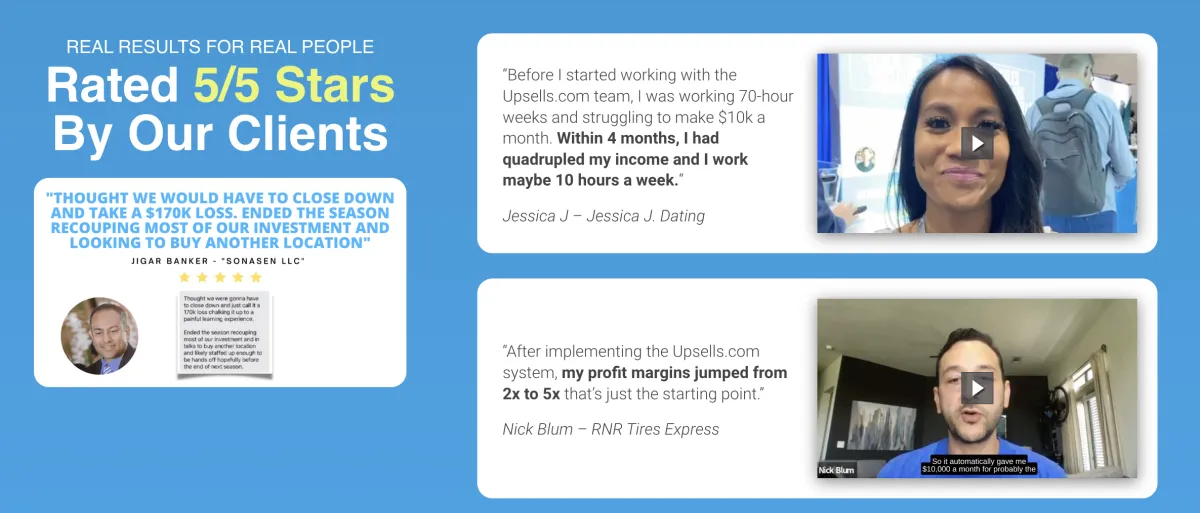How Many Sales are you missing out on because your sales team is too relaxed?
Our Opportunity Cost Calculator shows how much money you could be leaving on the table without an AI Sales Agent handling your follow up and upsells.


What We Do

#1 - Opportunity Cost Calculator
Less than 10% of Small Businesses have effective upselling systems. We help business owners discover how much money they could be leaving on the table.

#2 - AI Sales Agents
We build custom AI agents trained in upsells for Small Businesses. No commissions, no issues working 24/7. Our AI Agents close better than most sales people.

#3 - Smart CEO Consulting
We offer an affordable consulting service to help small business owners achieve their first 7 figure year.

#4 - Idea to Income Challenge
Don't have a business? Not a problem.
Take part in our free 7 day "Idea to Income" challenge and test your business by finding your first leads for free!

AI Sales Agents
Automate Your Sales with our AI Agents
Our done-for-you AI Sales Agents are designed to automate your sales and follow up processes.
With fast setup, ongoing support and no commissions, you'll get more sales, and keep more of the revenue from them too!
We use our AI Agents on this site, apply now to see it in action for yourself!
Get a $2,000 discount on set up (Limited time Offer)
All of our AI agents have been trained on the latest sales techniques from the best sales experts of our time! Imagine having clones of Hollywood famous sales people working for you! 24/7!
Our AI Agents craft messages based on your sales material, so the responses are custom, adaptable and human like.


SMART CEO CONSULTING
Turn your idea into income in just 7 days! Follow along with our step-by-step process and see if your business idea has what it takes to generate revenue in just 7 days!
(Perfect for small businesses, entrepreneurs, and coaches ready to take action.)
The idea to income challenge is completely free!
See for yourself how our proven system can turn your idea into a real revenue generating business in just one week!



Idea to Income Challenge
Turn your idea into income in just 7 days! Follow along with our step-by-step process and see if your business idea has what it takes to generate revenue in just 7 days!
(Perfect for small businesses, entrepreneurs, and coaches ready to take action.)
The idea to income challenge is completely free!
See for yourself how our proven system can turn your idea into a real revenue generating business in just one week!

What Clients Are Saying...

"Our AI Sales Agents Solve a Problem
That Almost Every Business Struggles with"
Most Sales people just don't want to put in the work to sell to your customers the way that you need them to.
Our AI Agents do the work.
Adam Lyons - Founder
Our Pricing
Starting Out?
Ideal for 5- to 6-figure companies
No signup required to begin!
See how effective our system is for yourself.
Boost your revenue with our system before you take the leap to work with us.
$0
Entrepreneur
Ideal for 7-figure companies
Custom Lead Scoring System
Work With Our Team to Create a Lead Nurturing System Unique to You
Custom AI Agents & Experienced Human Sales Rep to Facilitate Sales
Our Team Works With You to Create Fresh Lead Magnets For New Sales
$10,000 Initial Setup
$4,000 /mo.
Enterprise
Ideal for 8-figure+ companies
Custom Lead Scoring System
We Create a Lead Nurturing System Unique to Your Brand
Custom AI Agents & Dedicated Experienced Human Sales Reps to Manage All Aspects of Sales
We Create Fresh Lead Magnets To Boost Sales Consistently
Apply For Pricing
Frequently Asked Questions
Why should I trust a cyborg sales team when traditional sales methods have worked for us?
Hey, we get it—if it ain't broke, why fix it, right? But imagine mixing a super-smart AI with a savvy human sales pro. That's our Cyborg Sales Team! While AI can Follow up 24/7 to respond when the customer is ready to buy, and can handle objections and stay on brand better than any human, it sometimes misses the human touch of rapport and contextual understanding. That's where our humans step in. They monitor the AI's work, tweak things as needed, and add that personal flair only a real person can provide. It’s like getting the best of both worlds: tech efficiency and human empathy.
What if our company isn't your typical client? Can we still get something out of this?
Totally! Our Cyborg Sales Team is pretty versatile, and we love a good challenge. Even if you're not our "typical" client, we encourage you to apply (not to mention the fact that it’s free!). Our service is super adaptable, and we're confident we can bring value to a wide range of businesses. Plus, even if we don't end up working together, you'll get some cool insights and tips from our free training on using cyborg sales. So, it's a win-win!
How do I know if the initial investment is worth it?
Great question! We understand that shelling out cash can feel like a leap of faith. That's why we offer a free 7-day challenge. It's like a test drive but for your sales! You get to see how system can boost your revenue without spending a dime upfront. And our transparent pricing and clear breakdown of services mean no surprises. Try before you buy—what's not to love?
How does your 'Forever Follow Up' work? Isn't that just a fancy term for spamming?
Haha, we get it—nobody likes spam! But don’t worry, our "Forever Follow Up" is nothing like that. We create super engaging content that keeps your leads interested and talking to us. It’s all about keeping the conversation going in a fun and meaningful way. Think of it like a friendly nudge that keeps you top-of-mind without being annoying. Our AI helps keep track of timing and preferences, while our human team adds the personal touch to make sure every message adds value, education and is something they WANT to receive
© Copyright 2024. All rights reserved.
